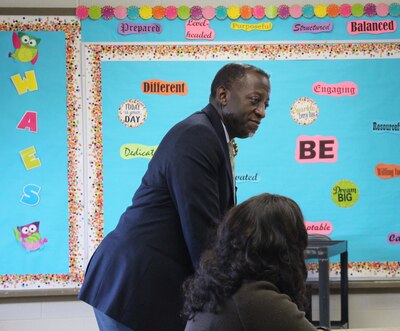Tennessee’s turnaround district — now in its seventh year — launched a parent congress this month to get input from parents about how to improve. The problem? Only one parent came.
The lack of attendees highlights a larger issue for the Achievement School District: It’s difficult to get parents to participate when district leaders historically have been hard to reach.
When Sharon Griffin was named the district’s leader last year, she said one of her first major goals was to reconnect to the communities her schools serve. During the interview process for a new superintendent, Memphians reiterated that they felt distant from district leadership, which had previously been based in Nashville.
Griffin became the first Memphian to lead the district, which has taken over 28 Memphis schools and tasked charter school organizations with improving academic performance. Two schools are based in Nashville. Originally created to boost schools in the bottom 5 percent academically, the district has struggled to show improvement. Of the 30 schools in the district, nine have climbed out of the bottom 5 percent.
The launch of the parent congress comes about eight months after Griffin took charge, when she said one of her first orders of business would be establishing an advisory team of local parents, students, and faith leaders. Despite the low turnout this month, Griffin decided to hold the meeting with just Brittany Jolly, the parent from Whitney Achievement Elementary who came and brought her three children. There were also two other district representatives at the meeting.
“We have to create a committee that as we make decisions we hear from you,” Griffin told Jolly, who sat directly next to her in a spacious classroom at Whitney Achievement. “Even though your school has a principal, I am responsible for the whole district, and you matter. You’re the person we have to listen to, and nothing is too small or too large.”
About a dozen parents had been nominated by their schools to be part of the parent congress, said Bobby White, chief of external affairs for the district. As the minutes passed by and it became clear more parents weren’t coming, White explained that transportation issues and communication mix-ups prevented all but Jolly from joining.
In future meetings, the group will be tasked with giving feedback to Griffin and her central office staff on issues such as how to spend state grants on turnaround work and what a district-wide policy on family engagement should entail.
White said the first group of parents will represent four state schools: Libertas Elementary Schools, Memphis Scholars Raleigh Egypt Middle Schools, Georgian Hills Achievement Elementary School, and Nashville-based Neely’s Bend Middle School. But he added that other parents, such as Jolly from Whitney Achievement, were invited as well. Slowly, the group is expected to grow to represent all the achievement schools.
But first, the district needs to find a way to get parents physically to the table.
“I’ve got to figure out what I need to do,” Griffin told Jolly and her staff gathered at Whitney Achievement. “If this meeting needs to be on a Sunday afternoon at church, I’ll do it. I need parents to help us think through how best to get the message out. Why isn’t this room overly full?”

Jolly suggested that Griffin’s staff allow parents to call or video conference into meetings, as well as offering the meetings at different times. How often the group will meet is still up in the air, but Griffin said she would like for parents to gather monthly.
“I got involved because I’ve been volunteering a lot,” Jolly told Chalkbeat before the meeting. “It can be hard for a lot of parents to get information on what’s happening at their schools. I want to know exactly what’s going on.”
Unlike a traditional school district, there is not an elected school board for the achievement district. Each charter organization has its own board, made up of appointed members. This has made the district hard to hold accountable, said Eligah Sledge, a member of Memphis Lift, a parent advocacy group.
“There aren’t meetings in a public forum like a regular district,” Sledge said. “It’s really dependent on individual schools to do that. But they’re not marketing their board meetings to parents as a place where they are welcome to come and talk about issues or learn what’s happening. There hasn’t been a place for that.”
Sledge’s children have been attending schools in the state-run district from the beginning. He said he has been following the district through its iterations of leadership, and that Griffin’s focus on parent voice is a welcomed change.
“When my students first started going to ASD schools, there was a parent and student advisory board at some of the schools,” Sledge said. “There were meetings and places to get information, but it dwindled down to like nothing.”
Bob Nardo, who worked for the achievement district before starting his own state-run charter school, Libertas, said that one of the district’s strengths has been concentrating power in schools instead of a central office.
“The vision was to get the central office as much out of the way as possible and put power in hands of schools,” Nardo said. “It’s good and necessary to hear from parents, but what’s even better is to give power to people who are working with them everyday.”
But Nardo added that the critique of district leadership as being hard for parents to reach was fair – especially when leadership was based in Nashville.
“Dr. Griffin has the opportunity to maintain the decentralized, localized power of ASD while also being as responsible to parents as she can be,” he said. “I am convinced that we cannot accomplish radical process in education without parent involvement.”
Parents interested in joining the congress can contact the district at 901-416-4831.

